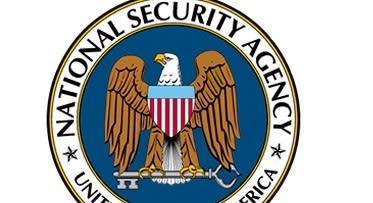NSA remains under fire from U.S. allies, leakers
The National Security Agency, the controversial U.S. surveillance agency, has had a tough few weeks, as new allegations from leaked documents have angered more allies.
The agency will also have to deal with a regime change, as its top two leaders announced their upcoming departure.
And Congress will likely turn its attention back to the agency, after it focused on the government shutdown and debt ceiling crisis for much of October.
To recap the latest developments, leaders in France and Mexico are upset with the Obama administration, after information leaked from former NSA contractor Edward Snowden showed the extent of NSA snooping into communications in Europe and Mexico.
That news surfaced after the White House confirmed last Thursday, on the same day the debt ceiling and shutdown ended, that NSA chief General Keith Alexander would retire next spring. Alexander has headed the NSA since 2005 and oversaw its expansion during the Bush and Obama administrations.
His civilian deputy, John C. Inglis, will also leave the NSA at the end of this year. Inglis has been the second-ranking official at the NSA since 2006.
The agency will likely have to explain information obtained by Snowden and released by Glenn Greenwald, and several other journalists, in coming weeks. Greenwald has announced he will leave the Guardian in the near future to start up a new company with eBay co-founder Pierre Omidyar to promote independent journalism.
With Greenwald living in Brazil and Snowden seeking asylum in Russia, the NSA has few options to stop the almost daily revelations coming out about NSA surveillance.
On Monday, Greenwald, speaking from Brazil, promised more revelations during a teleconference with reporters. In fact, there were clues that Greenwald could release most of the information he received from Snowden at some point.
Greenwald told the press that he consults with editors about the potential damage the leaks could cause to people or agencies in his reporting. But his major concern is what he calls an attack on “press freedoms” by the American and British governments in the wake of his revelations.
So far this week, a story appearing in the French newspaper Le Monde revealed that during one 30-day period in the past year, the NSA collected information from more than 70 million telephone calls made in France.
President Obama had to call French President Francois Hollande to explain the report and offer assurances that efforts are underway in the United States to balance privacy and security issues.
While the Le Monde story broke, the German weekly Der Spiegel said the NSA had also hacked into former Mexican president Felipe Calderón’s email accounts. The information came from a document provided by Snowden, and Greenwald acknowledged its existence in September.
The NSA operation’s goal, said Der Spiegel, was to obtain “diplomatic, economic and leadership communications which continue to provide insight into Mexico’s political system and internal stability.”
And then there is the question of Snowden’s status in Russia. His father, Lon, has returned from visiting his son at an undisclosed location.
Lon Snowden said his son might not be finished making disclosures.
“There’s much more to be shared,” Lon Snowden said at John F. Kennedy International Airport in New York.
Russian President Vladimir Putin said in the past that Russia would only allow Snowden to stay in the country if he didn’t take actions to harm the United States.
In addition to last week’s news about Snowden’s status, there were reports that the NSA was using a loophole in the surveillance laws to gather the email contact lists from Yahoo!, Google, Facebook, and Hotmail.
The Washington Post said the list collection depends on “secret arrangements with foreign telecommunications companies or allied intelligence services,” and the actions take place overseas.
Two U.S. intelligence officials told the Post that the operation gathers the contacts of many Americans, and the number is likely to be in the millions or tens of millions.
In Congress, Representative James Sensenbrenner, one of the original authors of the Patriot Act, wants explanations about the scope of the NSA’s activities.
“All the revelations to what the National Security Agency (NSA) has been doing, in my opinion, are shocking,” Sensenbrenner told a Wisconsin newspaper. “Orwell’s novel ‘1984’ has come to the United States with the type of data that is being collected by the NSA.”
Sensenbrenner and Senate Judiciary Committee Chairperson Patrick Leahy will introduce a new bill to hold the NSA accountable and put more safeguards in place.
Sensenbrenner wants to tighten Section 215 of the Patriot Act to limit the collection of telephone records. He also wants a special advocate representing privacy interests of the public, who can appear before the secret court that rules on surveillance issues.
Scott Bomboy is the editor in chief of the National Constitution Center.
Recent Constitution Daily Stories
Supreme Court adds a high-profile capital punishment case
Constitution Check: How strong is the same-sex marriage tide running?


